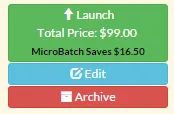MicroBatch
We have deployed a micro-batching feature which allows Requesters to break up their studies into smaller segments, and to include time intervals between the segments. We developed this feature to increase sample representation. This feature can also save 50% in MTurk fees.

The Problem
Here is why this feature is important for data quality. If a Requester launches a study on Monday afternoon, there may be a bias in the sample toward people who are not working on a weekday (unemployed, stay at home parents etc.)
The Solution
Micro-batching solves this problem. With this feature, a study that is open to, for example, 140 Workers can be set to sample Workers every 6 hours for 1 week. This HIT will be open to 5 people every six hours. Workers will be prevented from participating in more than one study segment.
The time interval between batches and the sample size of each batch are fully customizable. This effectively means that if the time interval is set to zero, there will be no difference between a micro-batched HIT and a regular HIT. Except that it will cost 20% instead of 40% under the current MTurk price fee policy.












